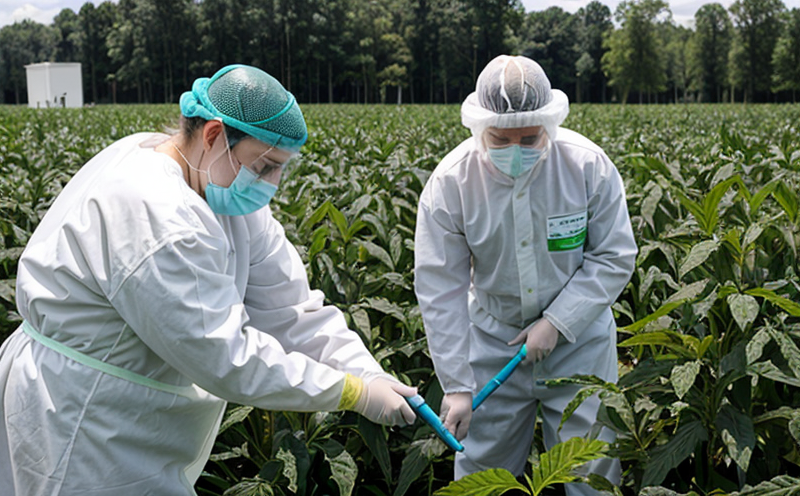ISO 17616 Soil Nitrogen Cycling Activity of Beneficial Microbes
The ISO 17616 standard is a critical tool in assessing the nitrogen cycling activity of beneficial microbes, such as biocontrol agents and other microorganisms used in agricultural settings. This test evaluates how effectively these microorganisms contribute to soil fertility through their role in the conversion of ammonia into nitrate—a process essential for plant growth.
The importance of this test lies in its ability to ensure that biocontrol agents and beneficial microbes are not only effective but also safe for use in various agricultural applications. By measuring nitrogen cycling activity, we can determine whether these microorganisms are performing their intended function without causing unintended environmental impacts. This is particularly important as the global demand for sustainable agriculture continues to grow.
The ISO 17616 test procedure involves several key steps: sample preparation, inoculation with the microorganism under study, incubation in a controlled environment, and subsequent analysis of nitrogen compounds present in the soil. The method is designed to simulate real-world conditions as closely as possible, allowing for accurate assessment of the microbe's performance.
One of the primary benefits of this test is its ability to provide actionable data that can guide decision-making processes in R&D and quality management. It allows companies to ensure their products meet rigorous international standards while also being effective in promoting sustainable agricultural practices. This not only enhances product reliability but also contributes positively to environmental conservation efforts.
In addition to its practical applications, the ISO 17616 test has significant implications for regulatory compliance and market entry strategies. Many countries have regulations requiring proof of effectiveness before allowing biocontrol agents into their markets. By adhering to this standard, businesses can demonstrate compliance with these requirements more easily, opening up new opportunities for growth.
The precision and accuracy provided by the ISO 17616 method make it an indispensable tool in both research and commercial settings. Researchers can use it to refine formulations or identify potential improvements; meanwhile, companies benefit from reduced risks associated with product failure due to incorrect performance. Furthermore, this level of assurance helps build consumer trust, which is crucial for long-term success.
Moreover, understanding the nuances of nitrogen cycling activity through ISO 17616 testing provides insights into broader ecological dynamics within agricultural ecosystems. Such knowledge can inform strategies aimed at enhancing overall soil health and resilience against climate change impacts like increased temperatures or changes in precipitation patterns.
For those involved in quality management, compliance officers, R&D engineers, and procurement professionals looking to stay ahead of industry trends, mastering the principles behind ISO 17616 is essential. It offers a robust framework for evaluating microbial products that contribute positively towards sustainable agriculture practices globally.
Why Choose This Test
Selecting the right testing method is crucial when dealing with complex biological systems like soil microbiomes, where numerous factors influence outcomes. The ISO 17616 test stands out because it specifically targets the nitrogen cycling activity of beneficial microorganisms—a process that directly impacts plant nutrition and overall agricultural productivity.
- Comprehensive Assessment: Unlike simpler tests focused solely on microbial presence or general soil health, ISO 17616 delves into functional aspects critical for successful application.
- International Recognition: Adherence to international standards ensures consistency and comparability across different regions and markets.
- Informed Decision-Making: Provides reliable data that supports strategic decisions related to product development, regulatory compliance, and sustainable practices.
- Credibility & Trust: Demonstrates commitment to high-quality products and processes, enhancing brand reputation among stakeholders.
By choosing ISO 17616 testing, organizations invest in a thorough evaluation process that contributes significantly towards achieving their goals. Whether it's improving product efficacy or ensuring regulatory compliance, this test offers unparalleled insights into the performance of beneficial microbes.
Quality and Reliability Assurance
The reliability of results obtained from ISO 17616 testing is paramount for maintaining high standards in agricultural biotechnology. To ensure consistent outcomes, strict quality control measures are implemented throughout the testing process:
- Standard Operating Procedures (SOPs): Detailed protocols guide every step from sample collection to final analysis.
- Calibration: Instruments used undergo regular calibration checks to maintain accuracy.
- Training: Staff members receive ongoing training to stay updated on best practices and any updates to ISO standards.
- Validation: Each batch of reagents and equipment is validated before use to ensure they meet specified requirements.
These measures not only enhance the credibility of test results but also contribute towards fostering trust among clients, regulatory bodies, and other stakeholders. By adhering rigorously to these protocols, we uphold our commitment to delivering accurate, reliable information that supports informed decision-making in agricultural biotechnology.
Use Cases and Application Examples
The application of ISO 17616 is extensive across various sectors within agriculture, horticulture, and environmental science. Here are some practical examples:
- Agricultural Biotechnology: Ensuring that new biocontrol agents or beneficial microbes meet stringent performance criteria before market release.
- R&D: Monitoring the efficacy of novel formulations during development stages to optimize their functionality.
- Quality Assurance: Verifying compliance with international standards for existing products already in use.
- Sustainability Initiatives: Supporting projects aimed at enhancing soil health and reducing synthetic fertilizer usage through naturally occurring beneficial microbes.
These case studies underscore the versatility of ISO 17616 testing, highlighting its role in driving innovation while ensuring safety and efficacy. As global challenges persist regarding resource utilization and environmental protection, this test plays a vital part in finding solutions tailored to specific regional needs.





